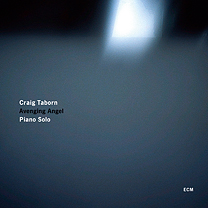While listening to Craig Taborn‘s solo piano CD, Avenging Angel, and chastising myself for thinking of Keith Jarrett so many times, I got the itch to give Jarrett’s Vienna Concert a spin.
 It’s a 1992 ECM album of solo piano, just two long pieces. I can’t remember specifically why I bought this CD, as opposed to any other Jarrett piano disc, but I vaguely recall a side comment in a jazz magazine about how proud Jarrett was of this particular recording. Jarrett concurs with this note in the liner card: “I have courted the fire for a very long time, and many sparks have flown in the past, but the music on this recording speaks, finally, the language of the flame itself.”
It’s a 1992 ECM album of solo piano, just two long pieces. I can’t remember specifically why I bought this CD, as opposed to any other Jarrett piano disc, but I vaguely recall a side comment in a jazz magazine about how proud Jarrett was of this particular recording. Jarrett concurs with this note in the liner card: “I have courted the fire for a very long time, and many sparks have flown in the past, but the music on this recording speaks, finally, the language of the flame itself.”
Not to be dramatic or anything.
“Vienna, Part I” does shine. The first third of the piece is built from the richly comforting gospel music Jarrett is so good at. There’s a slow bassline in there that’s every bit as delightful as that one riff that I think made The Köln Concert so famous. From there, he shifts into a phase of stone-cold chords, blocks of concrete descending amid periods of temporary quietude.
Shortly after the halfway mark is when things suddenly spark. Jarrett comes out of a quiet pause with a fast, fiery rhythm in an odd tonality that then shifts further off the rails, gathering, brewing, intensifying. After about four minutes of this, he bursts forth, splashing madly up and down the keyboard while still keeping the same chaotic tonality intact. Those last six words are crucial. He’s taken this mood, this moment, and driven it outward, a wider radius that turns out to be perfectly comfortable and appropriate, a necessary conclusion.
Then the mad keyboard fluttering — fast but always in more of a ur-Jarrett rhythm than a Cecil Taylor spattering — slowly gives way to a pure major key, and from there, Jarrett downshifts back into big, grand chords that manipulate the heartstrings, a grand finale of seven or eight minutes.
There’s a characteristically indulgent side to the finale, but Jarrett does earn it. It’s a cooldown at the end of a magnificent race. Was it truly his best solo work at the time? I can’t say; I’ve delved only the surface of his solo concerts. (I haven’t heard the Sun Bear Concerts, in particular.) But I do feel like Vienna is monumental in a way few other musicians can match. Köln is the pop hit; Vienna might be Jarrett’s deeper, less appreciated masterpiece.
Speaking of underappreciated masterpieces — I notice The Survivors’ Suite is available on eMusic and probably on other legitimate download sites. Go get it. Recorded with Jarrett’s classic quartet (Dewey Redman, Charlie Haden, Paul Motian), it’s an epic piece that’s unique in Jarrett’s catalogue. That’s a story for another day.
